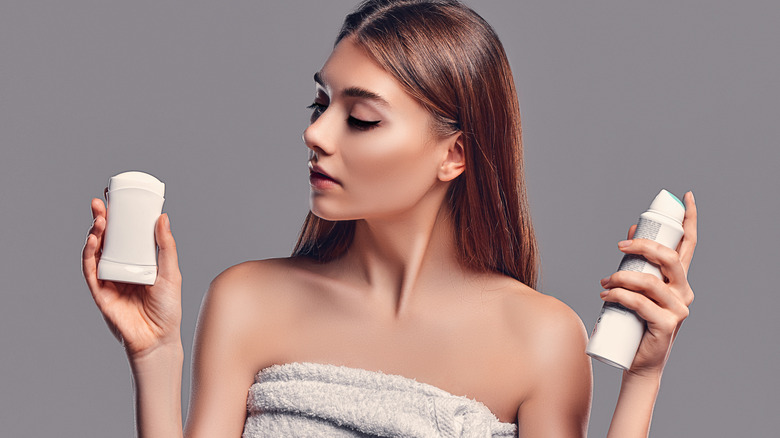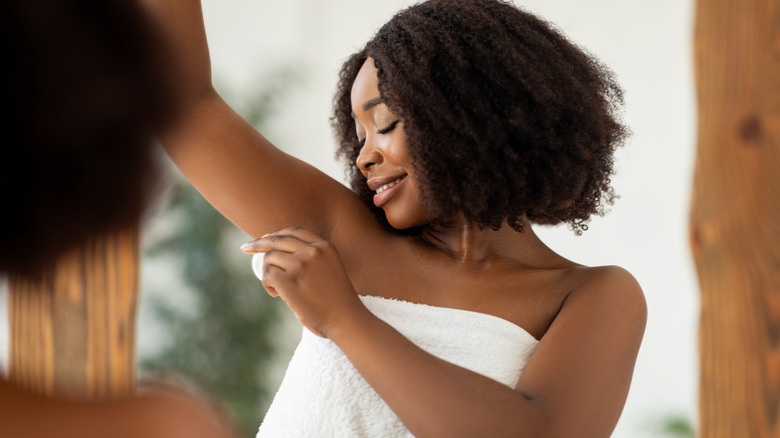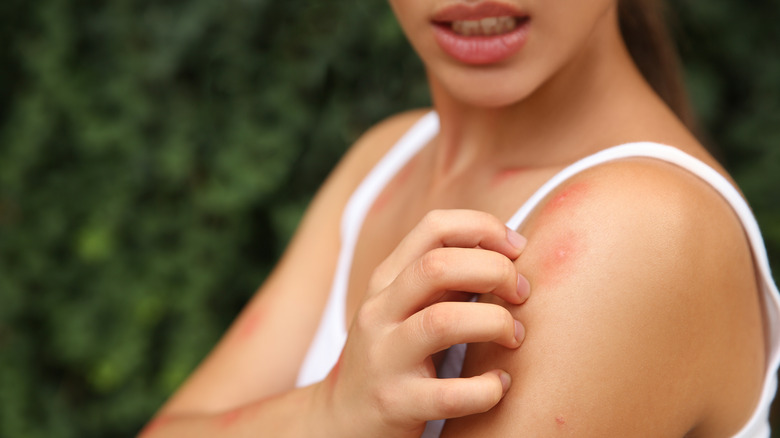These Are The Most Important Places To Use Deodorant And You're Probably Missing Them
Deodorant and antiperspirant are common personal hygiene staples. Contrary to popular belief, there are key differences between the two. According to WebMD, deodorant reduces body odor while antiperspirant reduces sweat. Both products contribute to cleanliness, but only antiperspirant is classified as a drug by the Food and Drug Administration.
There are major benefits to using deodorant and antiperspirant when it comes to moisture and smell. The main objective is to combat sweat. Sweat is the body's natural response to cool itself down in situations where there is excess heat (per Healthline). There are sweat glands in several areas of the body including the armpits, groin, and nipples.
Body odor doesn't come from the sweat itself, but from the combination of sweat and bacteria that's already on your skin (via Cleveland Clinic). The odor can also be affected by different factors including diet, medications, or hormonal changes. Deodorant can successfully mask body odor, but if you're seeking to sweat less, it's important to pick a product that includes antiperspirant. Most antiperspirants contain aluminum as an active ingredient, but there are aluminum-free options too.
Where else can deodorant be applied?
The most common area to put deodorant is of course the armpits, but it can be applied in more than just one place. According to the International Hyperhidrosis Society, anywhere your body sweats is a candidate for deodorant/antiperspirant application. That includes your feet, hands, and legs. It may seem unusual, but putting deodorant in several areas can improve many potentially sweaty and smelly situations. However, you should consult your doctor before applying antiperspirant to sensitive areas like your face, back, groin, or bra line.
An aerosol antiperspirant is particularly useful on feet. If you're trying to avoid a sweaty face, try rubbing antiperspirant along the hairline and neck to avoid anticipated moisture. This is an important trick for runners to keep sweat out of the eyes, notes Popsugar.
Finding the right kind of product can take trial and error. For those with sensitive skin, a natural deodorant may be a better option. It's important to be aware of listed ingredients and stop using a product if skin irritation occurs. Also, keep in mind that certain antiperspirants can damage clothing. Feel free to ask your doctor for product suggestions that may be better for different regions of the body.
Deodorant might stop chafing
Chafing is annoying and downright painful sometimes. Chafing can be mild, where you might only experience an itchy rash along with tender skin. However, if you don't take steps to cut down on the chafing, you might end up with a severe case that could include welts, broken skin, bleeding, and swelling (via Cleveland Clinic). Healthline reports that chafing can occur just about anywhere your skin gets rubbed. That said, common places where you might chafe include the thighs, groin area, and even nipples.
If you are prone to chafing, then deodorant might be your secret weapon. You can actually use deodorant to stop any kind of friction before it starts. For example, applying some to areas of the armpit that chafe or to your thighs where they rub together can ease your discomfort. Again, consider using a natural deodorant or one made for sensitive skin in order to avoid other issues.
Other places to consider using deodorant
Deodorant has other uses, too. Women know that the skin under the breasts can be problematic sometimes. From wearing sweaty sports bras to going braless, there are a number of ways that the skin under your breasts can become irritated. If you tend to sweat in that area, then it wouldn't hurt to try an antiperspirant to keep things dry, per Prevention. Sweating becomes an even bigger problem if it leads to an infection like a yeast infection (via Cleveland Clinic), and the last place you want to chafe is under your breasts.
You might not know it, but you can even use deodorant on bug bites. Because deodorant pulls moisture away from your skin, it might also remove any toxins left by a bug bite, per HGTV. You'll need to reach for a deodorant that contains aluminum chloride because that ingredient is what can reduce the swelling and pain bug bites bring, according to NBC New York.




